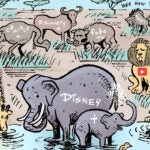As the largest digital audio platform in the US, Pandora is determined to capture a fair share of the burgeoning podcast market.
The digital audio platform, which received a $3.5 billion acquisition offer last month from SiriusXM, has been hard at work fixing podcasting’s discovery problem with its Podcast Genome Project.
Like it does for music, Pandora will use a recommendation engine to serve podcast episodes to listeners based on their behavior, while also making it easier to search for different shows and categories.
Better discovery for consumers opens up more opportunities for brands to target their audiences on podcasts, said Lizzie Widhelm, SVP of ad innovation and sales enablement at Pandora. Today, many podcast advertisers buy sponsorships across entire shows aimed at broad age and gender demos.
“You have to call Gimlet, Midroll, Wondery, etc., and be all over the place,” Widhelm said. “It’s just not efficient.”
In addition to revolutionizing the podcast listening and buying experiences, Pandora is aligning itself with premium content. The platform was the exclusive streaming partner for “Serial” season 3, which launched in September, with Experian and Bravo as the exclusive sponsors on its platform.
Pandora’s bet on podcasting is a bet on listener behavior, Widhelm said. According to Edison, 26% percent of Americans listen to podcasts monthly, 51% of which have an annual income of $150,000 or more.
“Listeners are gravitating toward spoken word content and we want to provide easy and effortless access,” she said. “Nailing the personalization piece is going to set us apart.”
Widhelm spoke with AdExchanger.
AdExchanger: How will SiriusXM’s $3.5 billion bid for Pandora affect the company’s strategy?
LIZZIE WIDHELM: It’s too soon to know. It’s business as usual. And we have so much going on that it’s so easy to be business as usual.
How far along is Pandora in developing the Podcast Genome Project?
The goal is to bring [listeners] podcasts that align with their interests and Pandora listening behavior. That’s hard to do.
You need to know at the episodic level, who was on the show? What were they talking about? What’s the context of the conversation? What kind of story are they telling? We have to analyze it all, it has to get tagged and then it has to be served up appropriately.
What opportunities does better podcast discovery create for brands?
Brands will be able to say, “I want to talk to moms 25 to 44. Tell me where I should be.” We’ll show them a media plan that might run across multiple shows, targeting their audience within the time frame they want to reach them. They won’t have to buy a whole show.
That’s not to say there aren’t sponsorship opportunities [like] what we did with “Serial” season 3.
How will you solve for the challenges in podcast measurement?
Measurement is all over the place. It’s fragmented. Nobody has aggregated scale in one place to buy based on media tactics that work for them. We have to recreate the wheel. To do that, we have to take the best practices we have in audio and push it into spoken word.
What kind of data are you going to provide back to podcast advertisers?
We’ll be fully transparent. They’ll see measurement a lot like what we deliver today: How many people, what audience, within what timeframe? Marketers are trying to understand how to make the investment. They want to spend money in the space and understand ROI. Our goal is to have it be as simple as it is with our music content.
Do you foresee doing more exclusive streaming deals like the one you did with “Serial”?
We will have all types of deals. I think we’ll take a page out of the video world.
There’s various cost structures. Some of the very highly produced shows might want to find an exclusive home and have an appointment-based moment, á la Netflix. Then there will be tons of content where they want to get on every platform possible and get the appropriate rev-share. It depends on the publisher and the creator.
You’ve pioneered a lot of new ad units for music, like rewarded video and sponsored listening. Will you translate those over to podcasts?
I think there’s an opportunity with some of the really compelling stories to put longer-form content at the front end of a show to unlock a limited interruption strategy. Sponsored listening is a product where we give an hour of uninterrupted listening for engaging with a piece of advertising. That will be for sure part of our offer.
You just launched programmatic for digital audio. Does programmatic have a place in podcasting?
Programmatic buying for audio into this new content type we believe will make a lot of sense. There will also be experiences we only sell direct. I also believe we’ll be able to automate creative production and allow people to target podcast listening.
How has demand for programmatic audio grown since you launched earlier this year?
We’re seeing really strong demand from existing and new advertisers. Advertisers that were focused on programmatic buying that couldn’t buy audio before are now asking, “Can we activate?” Advertisers have spent a lot of money on strengthening how they manage their consumer data and having the ability the real-time target and serve through programmatic capabilities.
This interview has been edited










